Charles E W Bean, Diaries, AWM38 3DRL 606/253/1 - 1918 - 1939 - Part 17
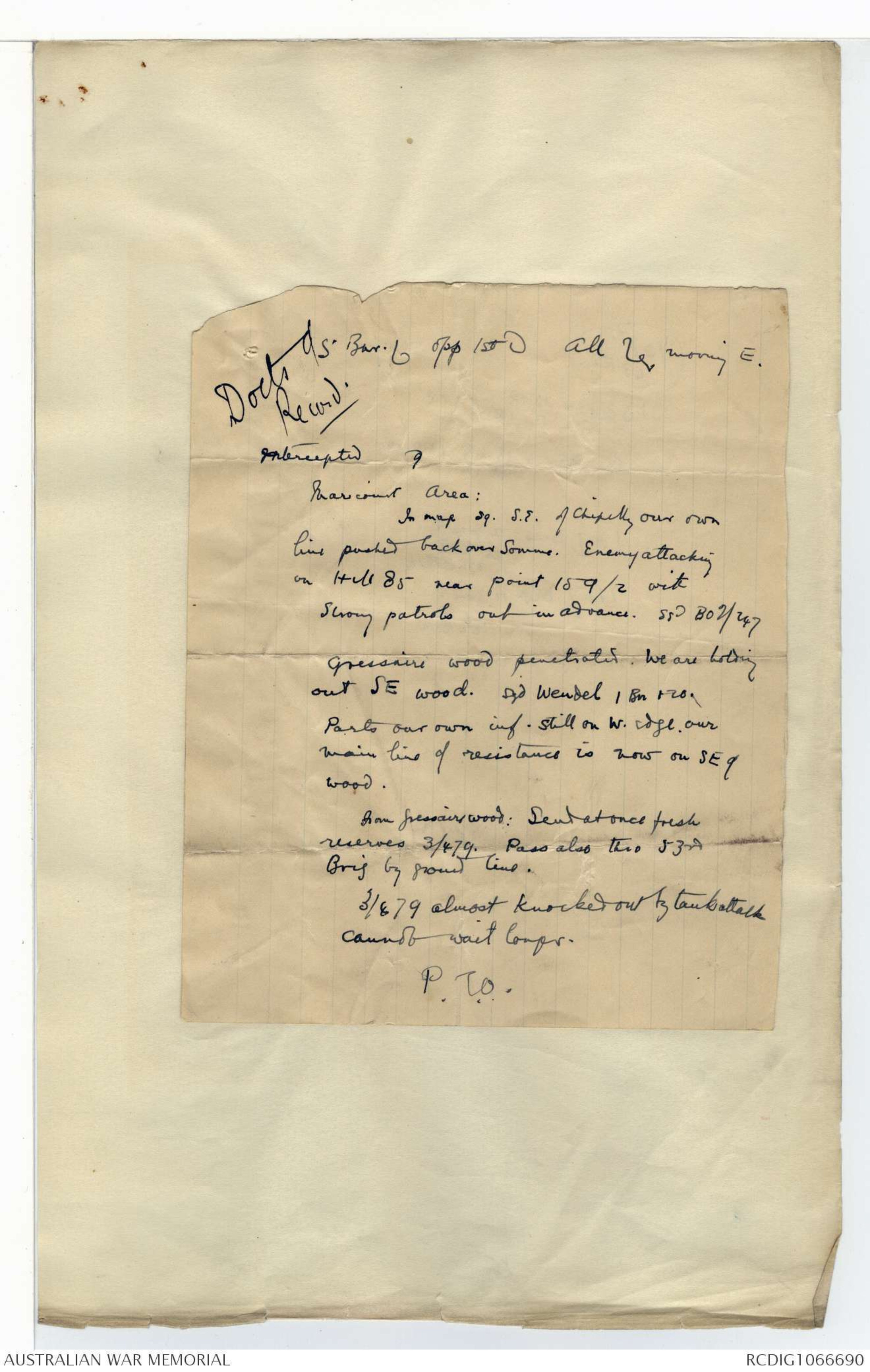
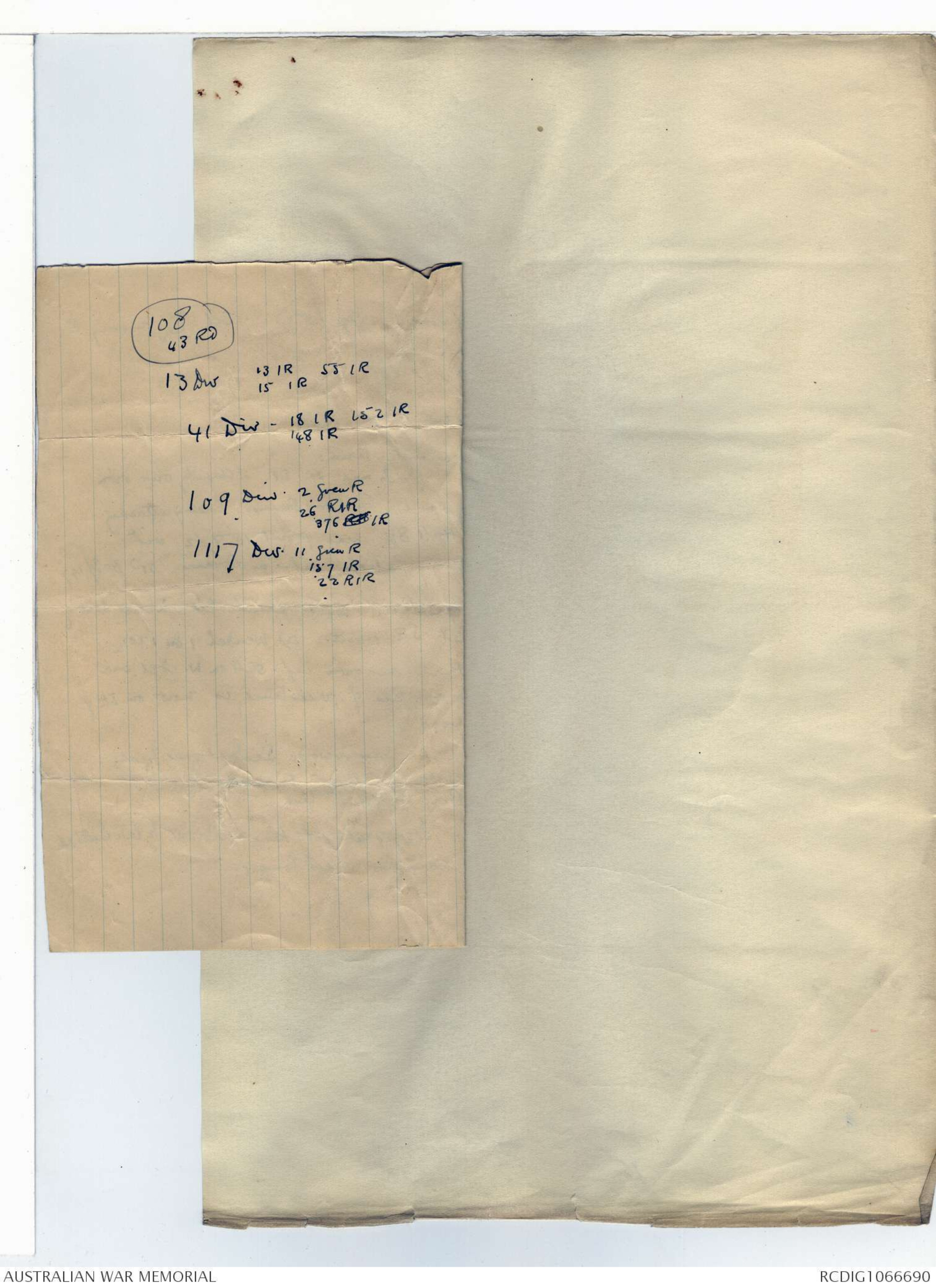
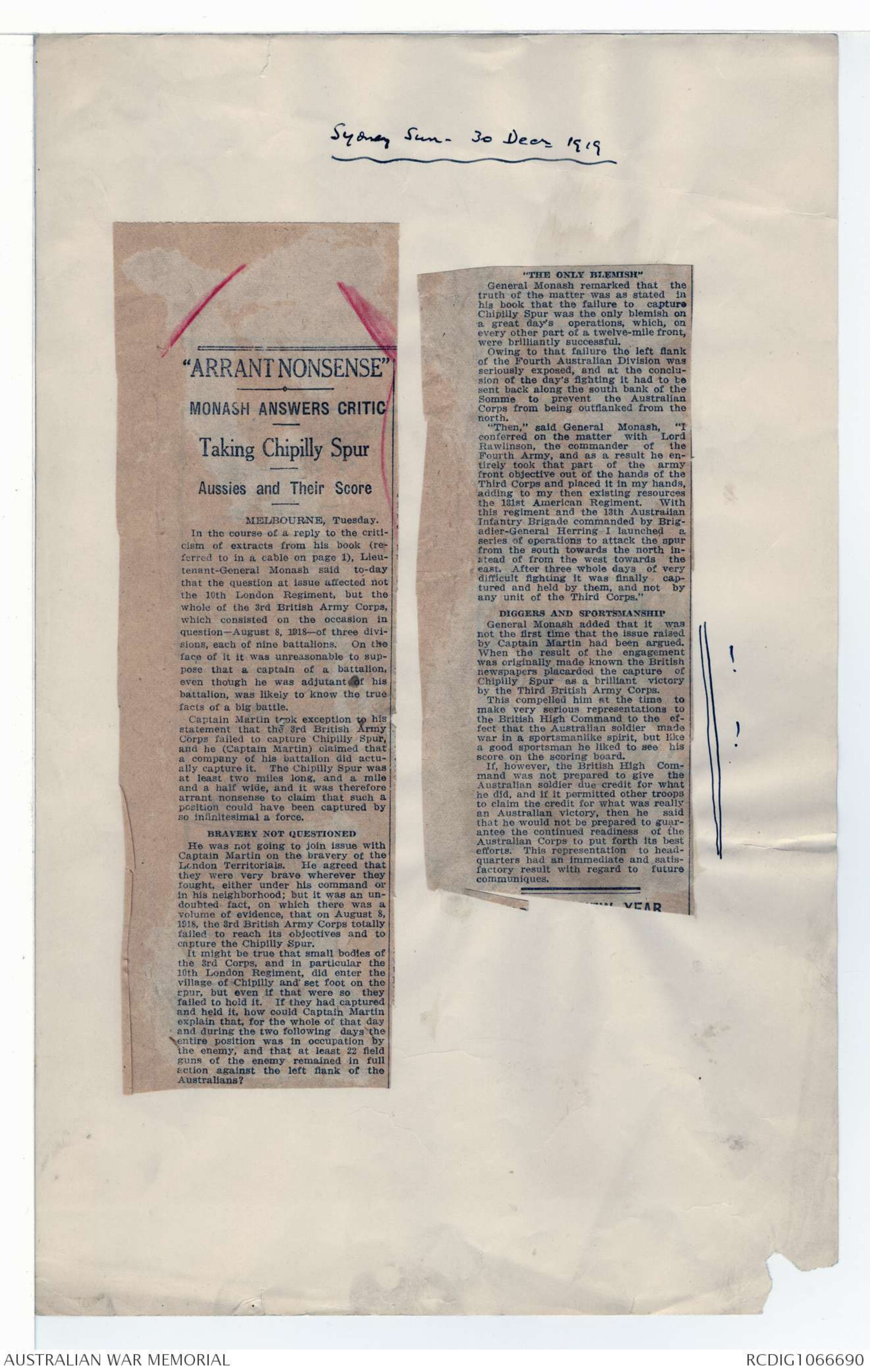
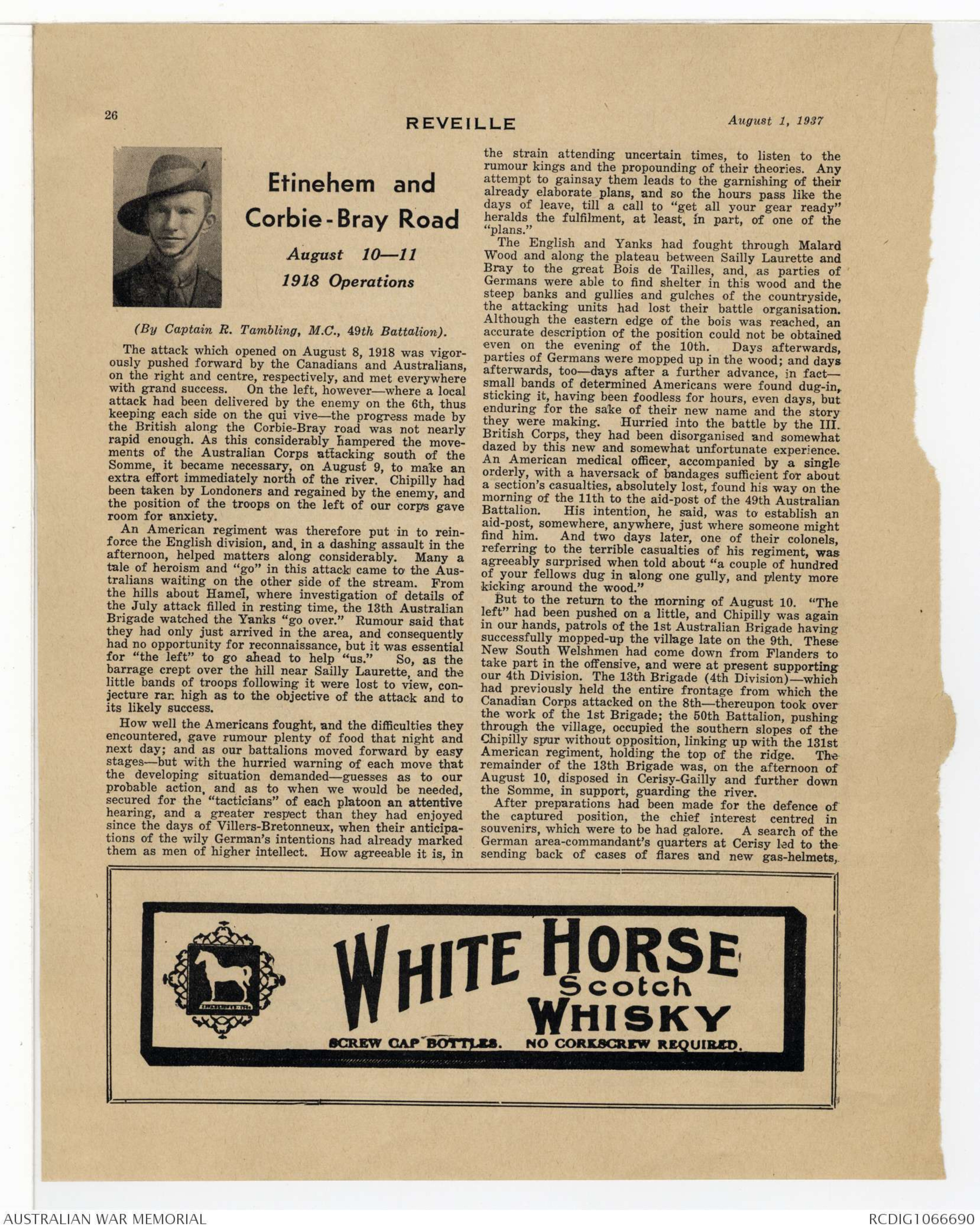
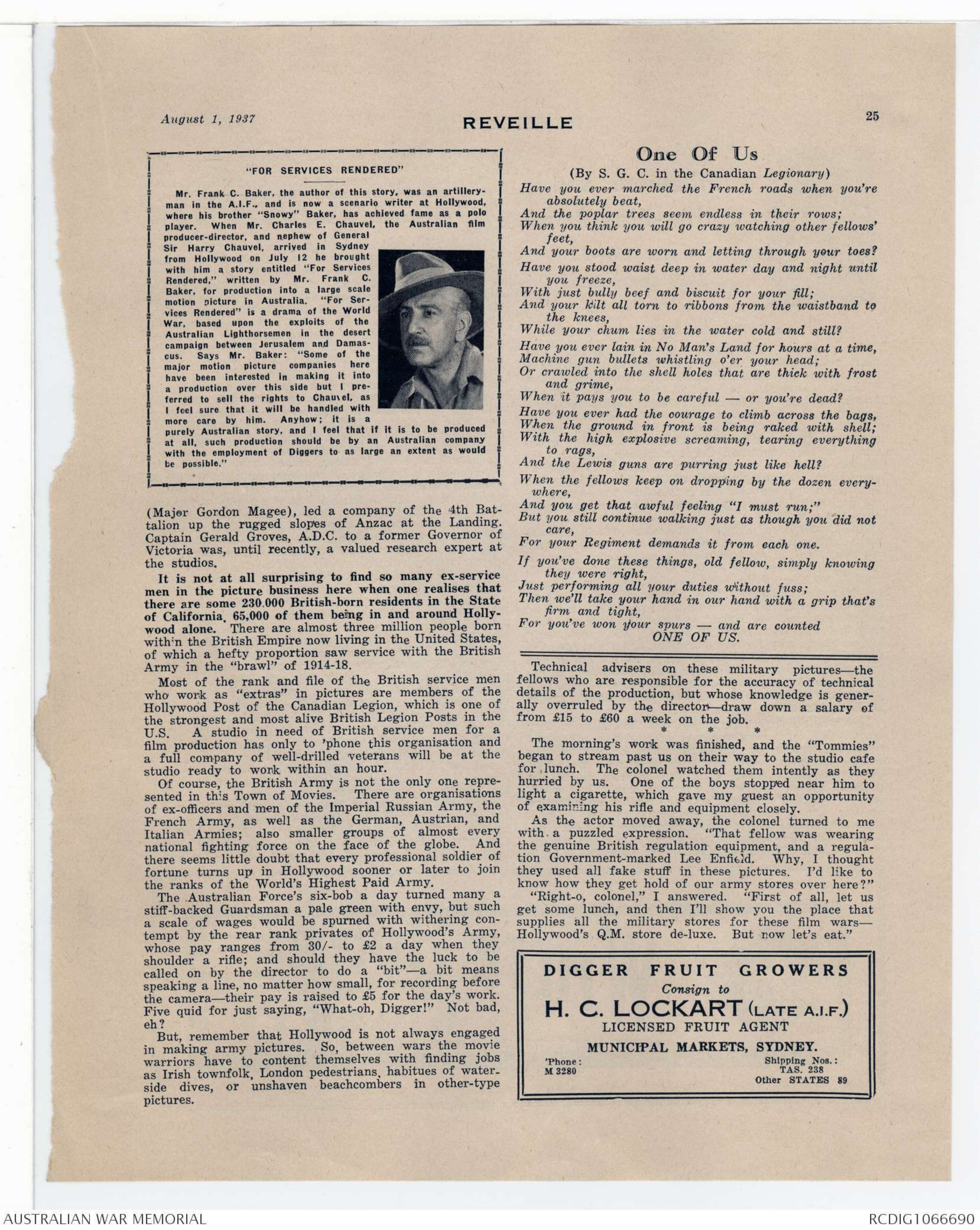
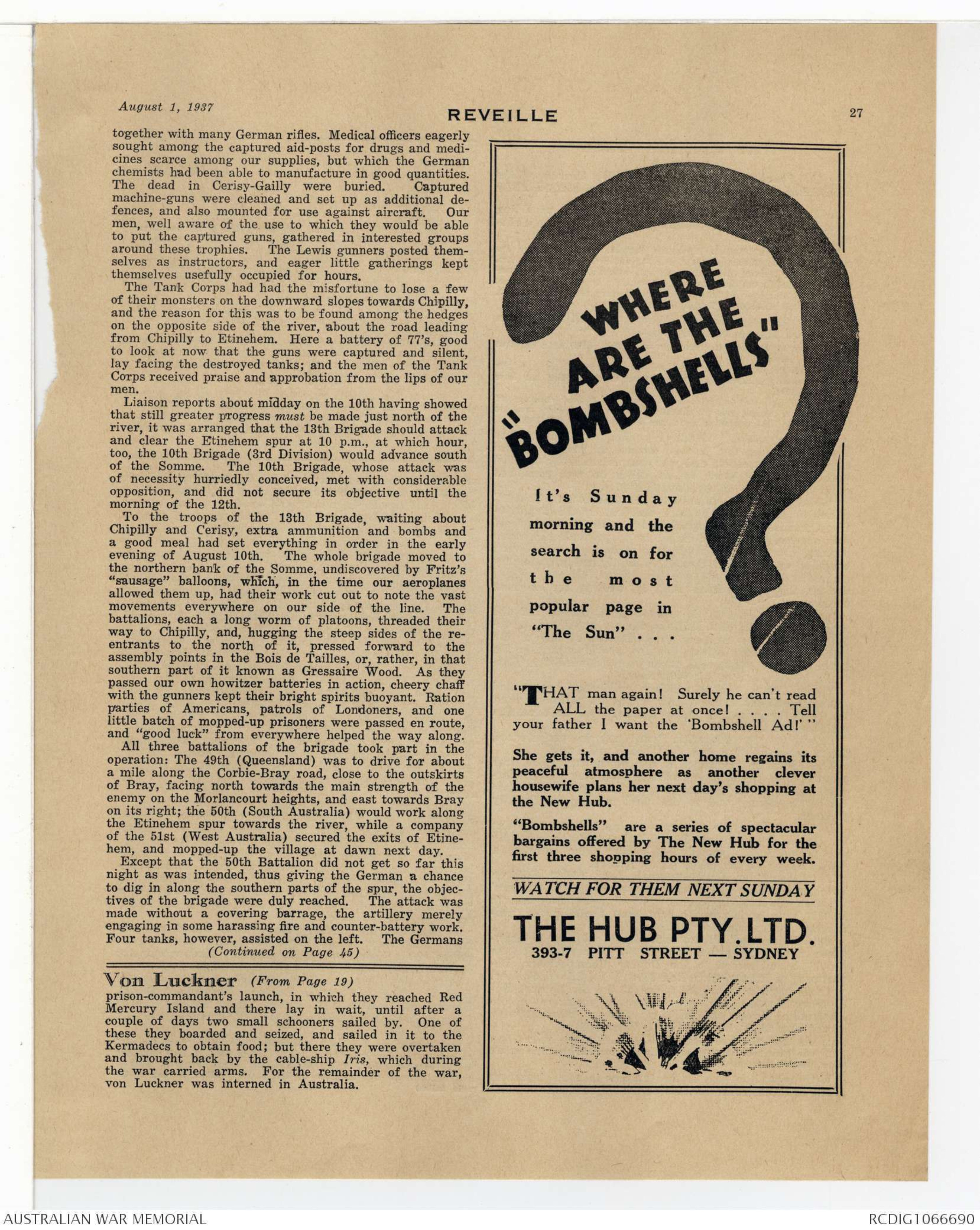
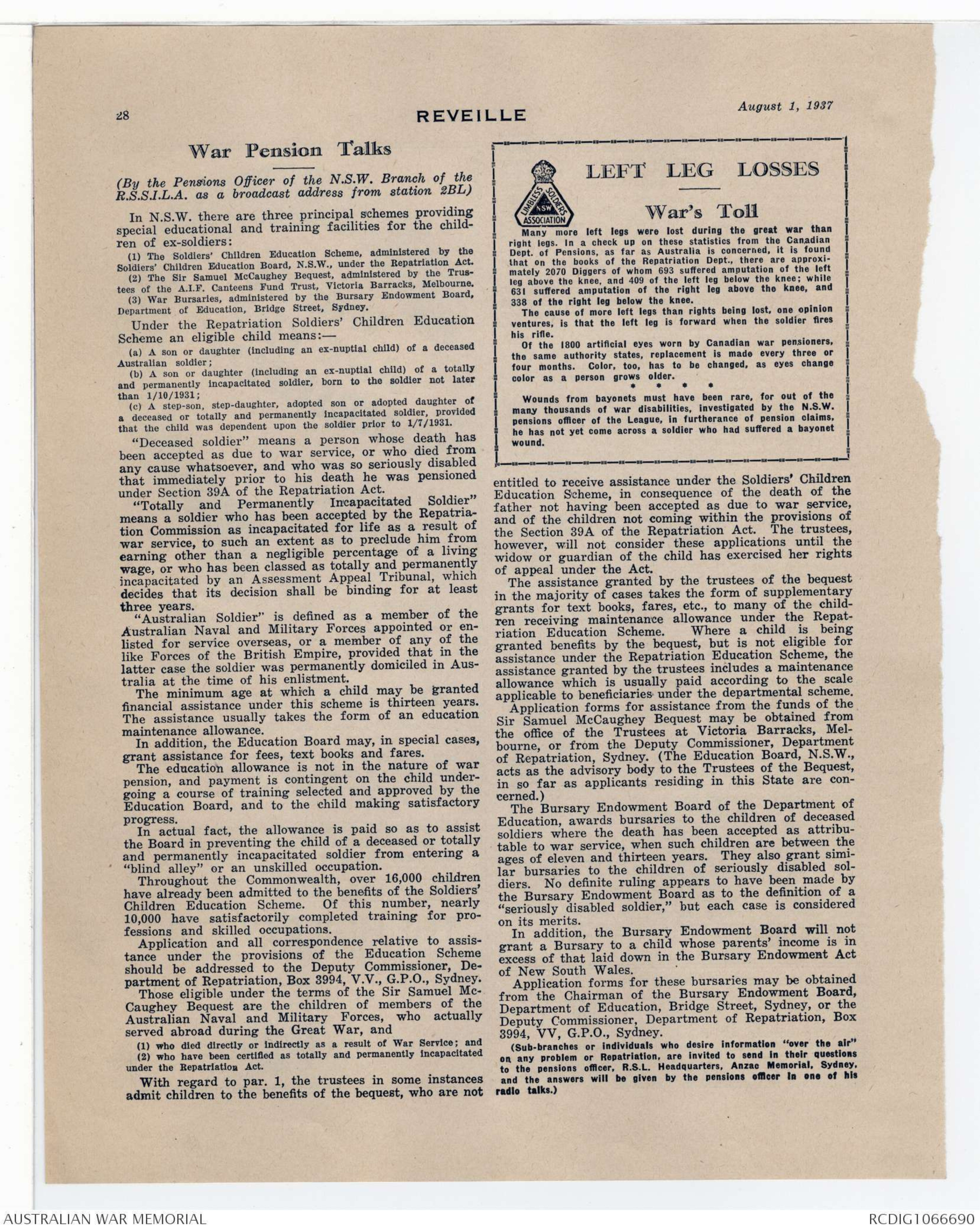
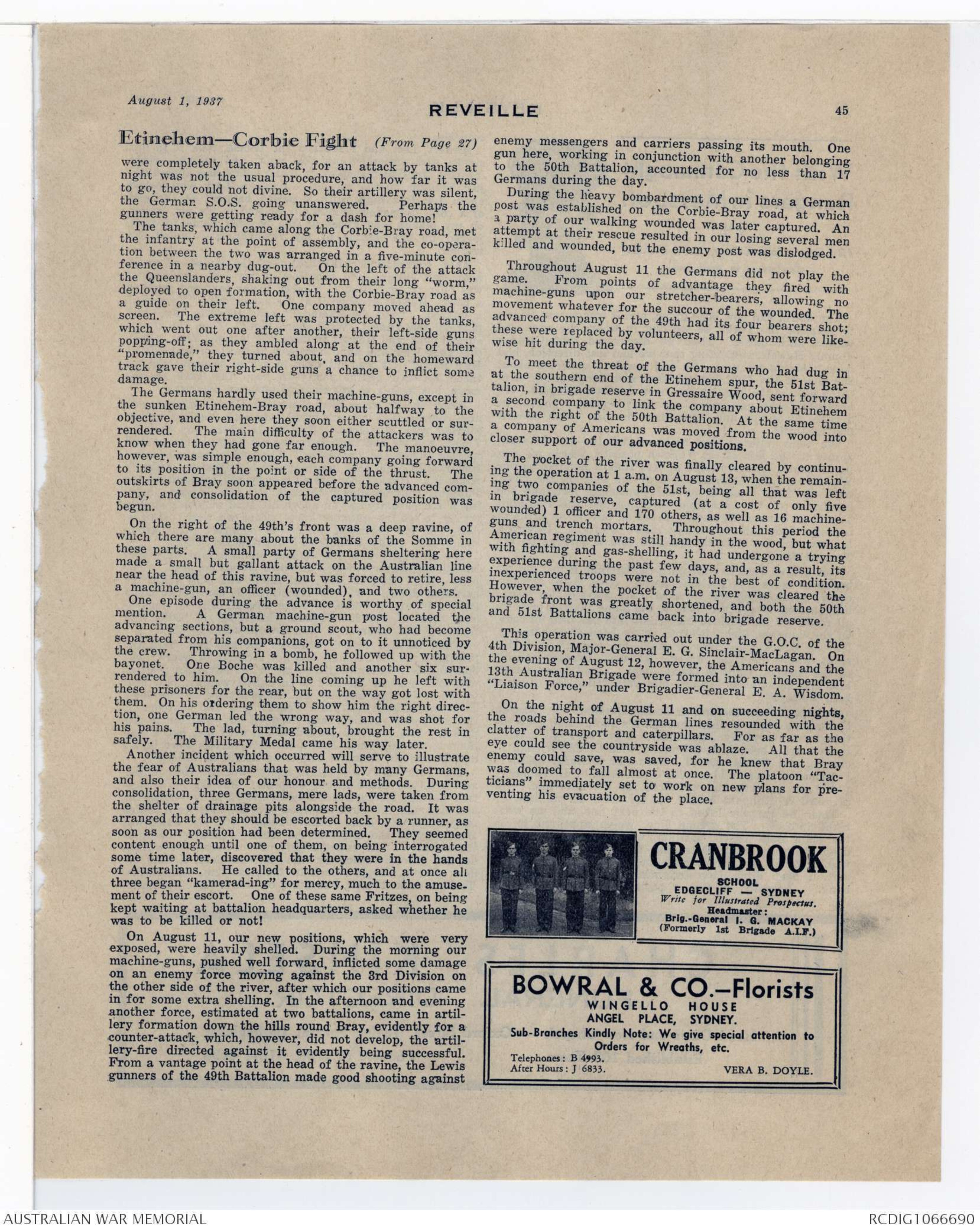
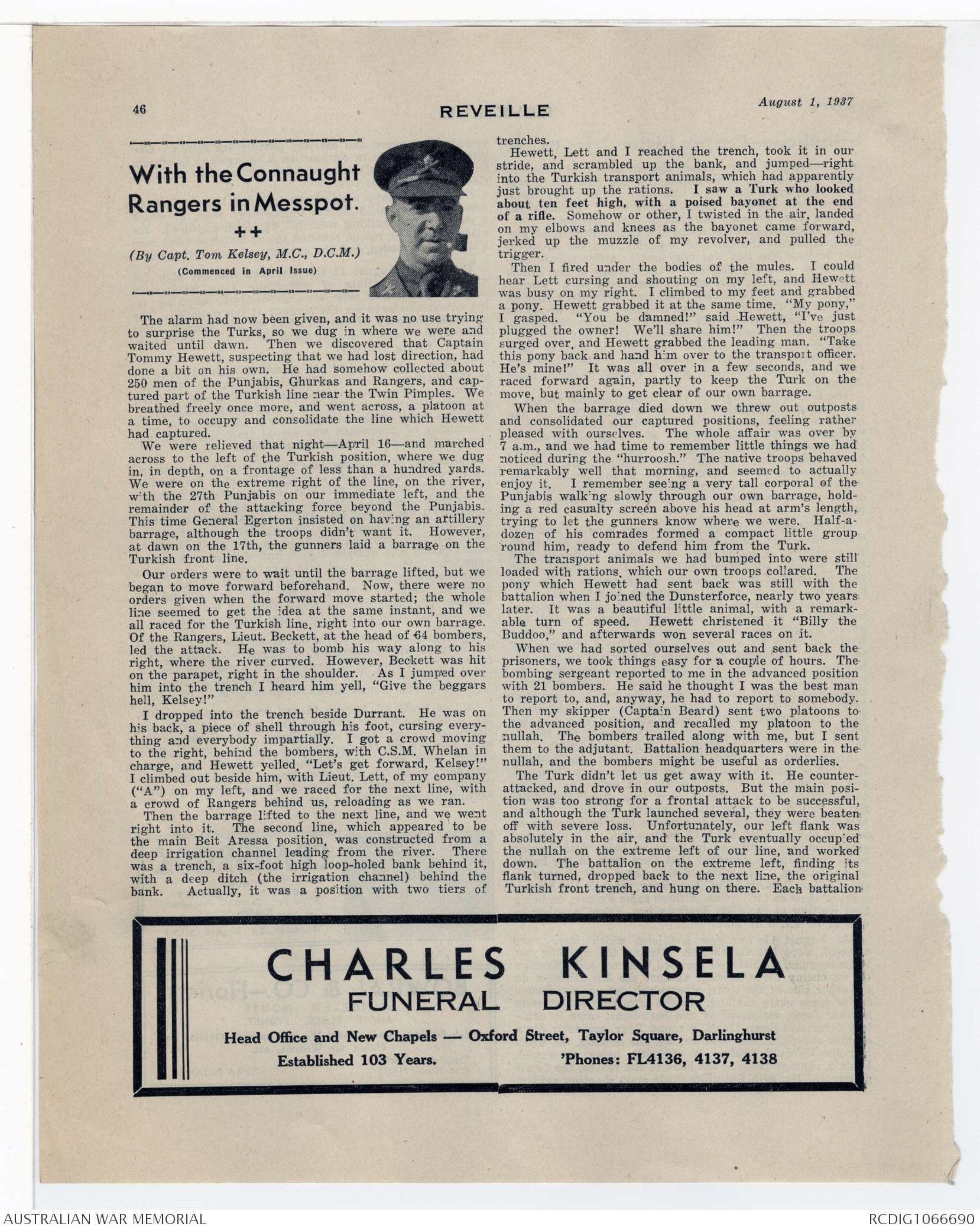
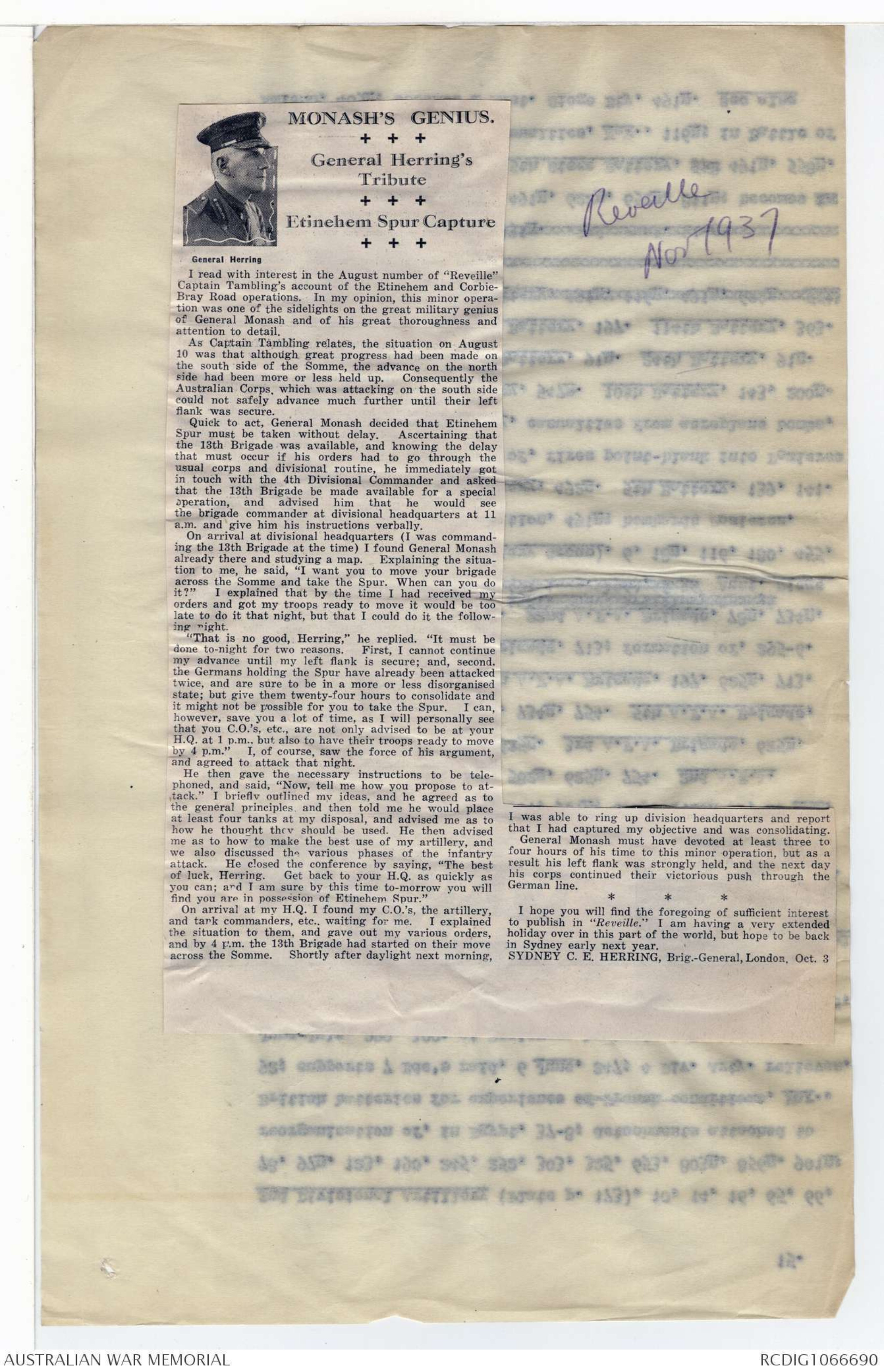
[*Docts of
Record.*]
5 Bar. Division opp 1st D all transport moving E.
Intercepted message
Maricourt area:
In map sq. S.E. of Chipilly our own
line pushed back over Somme. Enemy attacking
on Hill 85 near point 159/2 with
strong patrols out in advance. Sgd B02/247
Gressaire wood penetrated. We are holding
out SE wood. Sgd Wendel 1 Bn 1.20.
Parts our own inf. still on W. edge. our
main line of resistance is now on SE of
wood.
From Gressaire wood: Send at once fresh
reserves 3/479. Pass also thro 53rd
Brig by ground line.
3/479 almost knocked out by tank attack
cannot wait longer.
P.T.O.
108
43 Rd
13 Div 13 IR 55 IR
15 IR
41 Div - 18 IR 152 IR
148 IR
109 Div. 2 Gren R
26 RIR
376 RIR IR
1117 Div 11 Gren R
157 IR
22 RIR
Sydney Sun - 30 Decr 1919
"ARRANT NONSENSE"
MONASH ANSWERS CRITIC
Taking Chipilly Spur
Aussies and Their Score
MELBOURNE, Tuesday.
In the course of a reply to the criticism
of extracts from his book (referred
to in a cable on page 1), Lieutenant-
General Monash said to-day
that the question at issue affected not
the 10th London Regiment, but the
whole of the 3rd British Army Corps,
which consisted on the occasion in
question - August 8, 1918 - of three divisions,
each of nine battalions. On the
face of it it was unreasonable to suppose
that a captain of a battalion,
even though he was adjutant of his
battalion, was likely to know the true
facts of a big battle.
Captain Martin took exception to his
statement that the 3rd British Army
Corps failed to capture Chipilly Spur,
and he (Captain Martin) claimed that
a company of his battalion did actually
capture it. The Chipilly Spur was
at least two miles long, and a mile
and a half wide, and it was therefore
arrant nonsense to claim that such a
position could have been captured by
so infinitesimal a force.
BRAVERY NOT QUESTIONED
He was not going to join issue with
Captain Martin on the bravery of the
London Territorials. He agreed that
they were very brave wherever they
fought, either under his command or
in his neighborhood; but it was an undoubted
fact, on which there was a
volume of evidence, that on August 8,
1918, the 3rd British Army Corps totally
failed to reach its objectives and to
capture the Chipilly Spur.
It might be true that small bodies of
the 3rd Corps, and in particular the
10th London Regiment, did enter the
village of Chipilly and set foot on the
spur, but even if that were so they
failed to hold it. If they had captured
and held it, how could Captain Martin
explain that, for the whole of that day
and during the two following days the
entire position was in occupation by
the enemy, and that at least 22 field
guns of the enemy remained in full
action against the left flank of the
Australians?
"THE ONLY BLEMISH"
General Monash remarked that the
truth of the matter was as stated in
his book that the failure to capture
Chipilly Spur was the only blemish on
a great day's operations, which, on
every other part of a twelve-mile front,
were brilliantly successful.
Owing to that failure the left flank
of the Fourth Australian Division was
seriously exposed, and at the conclusion
of the day's fighting it had to be
sent back along the south bank of the
Somme to prevent the Australian
Corps from being outflanked from the
north.
"Then," said General Monash, "I
conferred on the matter with Lord
Rawlinson, the commander of the
Fourth Army, and as a result he entirely
took that part of the army
front objective out of the hands of the
Third Corps and placed it in my hands,
adding to my then existing resources
the 131st American Regiment. With
this regiment and the 13th Australian
Infantry brigade commanded by Brigadier-
General Herring I launched a
series of operations to attack the spur
from the south towards the north instead
of from the west towards the
east. After three whole days of very
difficult fighting it was finally captured
and held by them, and not by
any unit of the Third Corps."
DIGGERS AND SPORTSMANSHIP
[*!*]
General Monash added that it was
not the first time that the issue raised
by Captain Martin had been argued.
When the result of the engagement
was originally made known the British
newspapers placarded the capture of
Chipilly Spur as a brilliant victory
by the Third British Army Corps.
[*!*]
This compelled him at the time to
make very serious representations to
the British High Command to the effect
that the Australian soldier made
war in a sportsmanlike spirit, but like
a good sportsman he liked to see his
score on the scoring board.
If, however, the British High Command
was not prepared to give the
Australian soldier due credit for what
he did, and if it permitted other troops
to claim the credit for what was really
an Australian victory, then he said
that he would not be prepared to guarantee
the continued readiness of the
Australian Corps to put forth its best
efforts. This representation to headquarters
had an immediate and satisfactory
result with regard to future
communiques.
26 REVEILLE August 1, 1937
Etinehem and
Corbie-Bray Road
August 10-11
1918 Operations
Photograph - see original document
(By Captain R. Tambling, M.C., 49th Battalion).
The attack which opened on August 8, 1918 was vigorously
pushed forward by the Canadians and Australians,
on the right and centre, respectively, and met everywhere
with grand success. On the left, however—where a local
attack had been delivered by the enemy on the 6th, thus
keeping each side on the qui vive—the progress made by
the British along the Corbie-Bray road was not nearly
rapid enough. As this considerably hampered the movements
of the Australian Corps attacking south of the
Somme, it became necessary, on August 9, to make an
extra effort immediately north of the river. Chipilly had
been taken by Londoners and regained by the enemy, and
the position of the troops on the left of our corps gave
room for anxiety.
An American regiment was therefore put in to reinforce
the English division, and, in a dashing assault in the
afternoon, helped matters along considerably. Many a
tale of heroism and "go" in this attack came to the Australians
waiting on the other side of the stream. From
the hills about Hamel, where investigation of details of
the July attack filled in resting time, the 13th Australian
Brigade watched the Yanks "go over." Rumour said that
they had only just arrived in the area, and consequently
had no opportunity for reconnaissance, but it was essential
for "the left" to go ahead to help "us." So, as the
barrage crept over the hill near Sailly Laurette, and the
little bands of troops following it were lost to view, conjecture
ran high as to the objective of the attack and to
its likely success.
How well the Americans fought, and the difficulties they
encountered, gave rumour plenty of food that night and
next day; and as our battalions moved forward by easy
stages—but with the hurried warning of each move that
the developing situation demanded—guesses as to our
probable action, and as to when we would be needed,
secured for the "tacticians" of each platoon an attentive
hearing, and a greater respect than they had enjoyed
since the days of Villers-Bretonneux, when their anticipations
of the wily German's intentions had already marked
them as men of higher intellect. How agreeable it is, in
the strain attending uncertain times, to listen to the
rumour kings and the propounding of their theories. Any
attempt to gainsay them leads to the garnishing of their
already elaborate plans, and so the hours pass like the
days of leave, till a call to "get all your gear ready"
heralds the fulfilment, at least, in part, of one of the
"plans."
The English and the Yanks had fought through Malard
Wood and along the plateau between Sailly Laurette and
Bray to the great Bois de Tailles, and, as parties of
Germans were able to find shelter in this wood and the
steep banks and gullies and gulches of the countryside,
the attacking units had lost their battle organisation.
Although the eastern edge of the bois was reached, an
accurate description of the position could not be obtained
even on the evening of the 10th. Days afterwards,
parties of Germans were mopped up in the wood; and days
afterwards, too—days after a further advance, in fact—
small bands of determined Americans were found dug-in,
sticking it, having been foodless for hours, even days, but
enduring for the sake of their new name and the story
they were making. Hurried into the battle by the III.
British Corps, they had been disorganised and somewhat
dazed by this new and somewhat unfortunate experience.
An American medical officer, accompanied by a single
orderly, with a haversack of bandages sufficient for about
a section's casualties, absolutely lost, found his way on the
morning of the 11th to the aid-post of the 49th Australian
Battalion. His intention, he said, was to establish an
aid-post, somewhere, anywhere, just where someone might
find him. And two days later, one of their colonels,
referring to the terrible casualties of his regiment, was
agreeably surprised when told about "a couple of hundred
of your fellows dug in along one gully, and plenty more
kicking around the wood."
But to the return to the morning of August 10. "The
left" had been pushed on a little, and Chipilly was again
in our hands, patrols of the 1st Australian Brigade having
successfully mopped-up the village late on the 9th. These
New South Welshmen had come down from Flanders to
take part in the offensive, and were at present supporting
our 4th Division. The 13th Brigade (4th Division)—which
had previously held the entire frontage from which the
Canadian Corps attacked on the 8th—thereupon took over
the work of the 1st Brigade; the 50th Battalion, pushing
through the village, occupied the southern slopes of the
Chipilly spur without opposition, linking up with the 131st
American regiment, holding the top of the ridge. The
remainder of the 13th Brigade was, on the afternoon of
August 10, disposed in Cerisy-Gailly and further down
the Somme, in support, guarding the river.
After preparations had been made for the defence of
the captured position, the chief interest centred in
souvenirs, which were to be had galore. A search of the
German area-commandant's quarters at Cerisy led to the
sending back of cases of flares and new gas-helmets,
August 1, 1937 REVEILLE 25
"FOR SERVICES RENDERED"
Mr. Frank C. Baker, the author of this story, was an artillery-
man in the A.I.F., and is now a scenario writer at Hollywood,
where his brother "Snowy" Baker, has achieved fame as a polo
player. When Mr. Charles E. Chauvel. the Australian film
producer-director, and nephew of General
Sir Harry Chauvel, arrived in Sydney
from Hollywood on July 12 he brought
with him a story entitled "For Services
Rendered," written by Mr. Frank C.
Baker, for production into a large scale
motion picture in Australia. "For Services
Rendered" is a drama of the World
War, based upon the exploits of the
Australian Lighthorsemen in the desert
campaign between Jerusalem and Damascus.
Says Mr. Baker: "Some of the
major motion picture companies here
have been interested in making it into
a production over this side but I preferred
to sell the rights to Chauvel, as
I feel sure that it will be handled with
more care by him. Anyhow; it is a
purely Australian story, and I feel that if it is to be produced
at all, such production should be by an Australian company
with the employment of Diggers to as large an extent as would
be possible."
Photograph - see original document
(Major Gordon Magee), led a company of the 4th Battalion
up the rugged slopes of Anzac at the Landing.
Captain Gerald Groves, A.D.C. to a former Governor of
Victoria was, until recently, a valued research expert at
the studios.
It is not at all surprising to find so many ex-service
men in the picture business here when one realises that
there are some 230,000 British-born residents in the State
of California, 65,000 of them being in and around Hollywood
alone. There are almost three million people born
within the British Empire now living in the United States,
of which a hefty proportion saw service with the British
Army in the "brawl" of 1914-18.
Most of the rank and file of the British service men
who work as "extras" in pictures are members of the
Hollywood Post of the Canadian Legion, which is one of
the strongest and most alive British Legion Posts in the
U.S. A studio in need of British service men for a
film production has only to 'phone this organisation and
a full company of well-drilled veterans will be at the
studio ready to work within an hour.
Of course, the British Army is not the only one represented
in this Town of Movies. There are organisations
of ex-officers and men of the Imperial Russian Army, the
French Army, as well as the German, Austrian, and
Italian Armies; also smaller groups of almost every
national fighting force on the face of the globe. And
there seems little doubt that every professional soldier of
fortune turns up in Hollywood sooner or later to join
the ranks of the World's Highest Paid Army.
The Australian Force's six-bob a day turned many a
stiff-backed Guardsman a pale green with envy, but such
a scale of wages would be spurned with withering contempt
by the rear rank privates of Hollywood's Army,
whose pay ranges from 30/- to £2 a day when they
shoulder a rifle; and should they have the luck to be
called on by the director to do a "bit"—a bit means
speaking a line, no matter how small, for recording before
the camera—their pay is raised to £5 for the day's work.
Five quid for just saying, "What-oh, Digger!" Not bad,
eh?
But, remember that Hollywood is not always engaged
in making army pictures. So, between wars the movie
warriors have to content themselves with finding jobs
as Irish townfolk, London pedestrians, habitues of waterside
dives, or unshaven beachcombers in other-type
pictures.
One Of Us
(By S.G.C. in the Canadian Legionary)
Have you ever marched the French roads when you're
absolutely beat,
And the poplar trees seem endless in their rows;
When you think you will go crazy watching other fellows'
feet,
And your boots are worn and letting through your toes?
Have you stood waist deep in water day and night until
you freeze,
With just bully beef and biscuit for your fill;
And your kilt all torn to ribbons from the waistband to
the knees,
While your chum lies in the water cold and still?
Have you ever lain in No Man's Land for hours at a time,
Machine gun bullets whistling o'er your head;
Or crawled into the shell holes that are thick with frost
and grime,
When it pays you to be careful — or you're dead?
Have you ever had the courage to climb across the bags,
When the ground in front is being raked with shell;
With the high explosive screaming, tearing everything
to rags,
And the Lewis guns are purring just like hell?
When the fellows keep on dropping by the dozen everywhere,
And you get that awful feeling "I must run;"
But you still continue walking just as though you did not
care,
For your Regiment demands it from each one.
If you've done these things, old fellow, simply knowing
they were right,
Just performing all your duties without fuss;
Then we'll take your hand in our hand with a grip that's
firm and tight,
For you've won your spurs — and are counted
ONE OF US.
Technical advisers on these military pictures—the
fellows who are responsible for the accuracy of technical
details of the production, but whose knowledge is generally
overruled by the director—draw down a salary of
from £15 to £60 a week on the job.
The morning's work was finished, and the "Tommies"
began to stream past us on their way to the studio cafe
for lunch. The colonel watched them intently as they
hurried by us. One of the boys stopped near him to
light a cigarette, which gave my guest an opportunity
of examining the rifle and equipment closely.
As the actor moved away, the colonel turned to me
with a puzzled expression. "That fellow was wearing
the genuine British regulation equipment, and a regulation
Government-marked Lee Enfield. Why, I thought
they used all fake stuff in these pictures. I'd like to
know how they get hold of our army stores over here?"
"Right-o, colonel," I answered. "First of all, let us
get some lunch, and then I'll show you the place that
supplies all the military stores for these film wars—
Hollywood's Q.M. store de-luxe. But now let's eat."
August 1, 1937 REVEILLE 27
together with many German rifles. Medical officers eagerly
sought among the captured aid-posts for drugs and medicines
scarce among our supplies, but which the German
chemists had been able to manufacture in good quantities.
The dead in Cerisy-Gailly were buried. Captured
machine-guns were cleaned and set up as additional defences,
and also mounted for use against aircraft. Our
men, well aware of the use to which they would be able
to put the captured guns, gathered in interested groups
around these trophies. The Lewis gunners posted themselves
as instructors, and eager little gatherings kept
themselves usefully occupied for hours.
The Tank Corps had had the misfortune to lose a few
of their monsters on the downward slopes towards Chipilly,
and the reason for this was to be found among the hedges
on the opposite side of the river, about the road leading
from Chipilly to Etinehem. Here a battery of 77's, good
to look at now that the guns were captured and silent,
lay facing the destroyed tanks; and the men of the Tank
Corps received praise and approbation from the lips of our
men.
Liaison reports about midday on the 10th having showed
that still greater progress must be made just north of the
river, it was arranged that the 13th Brigade should attack
and clear the Etinehem spur at 10 p.m., at which hour,
too, the 10th Brigade (3rd Division) would advance south
of the Somme. The 10th Brigade, whose attack was
of necessity hurriedly conceived, met with considerable
opposition, and did not secure its objective until the
morning of the 12th.
To the troops of the 13th Brigade, waiting about
Chipilly and Cerisy, extra ammunition and bombs and
a good meal had set everything in order in the early
evening of August 10th. The whole brigade moved to
the northern bank of the Somme, undiscovered by Fritz's
"sausage" balloons, which, in the time our aeroplanes
allowed them up, had their work cut out to note the vast
movements everywhere on our side of the line. The
battalions, each a long worm of platoons, threaded their
way to Chipilly, and, hugging the steep sides of the re-entrants
to the north of it, pressed forward to the
assembly points in the Bois de Tailles, or, rather, in that
southern part of it known as Gressaire Wood. As they
passed our own howitzer batteries in action, cheery chaff
with the gunners kept their bright spirits buoyant. Ration
parties of Americans, patrols of Londoners, and one
little batch of mopped-up prisoners were passed en route,
and "good luck" from everywhere helped the way along.
All three battalions of the brigade took part in the
operation: The 49th (Queensland) was to drive for about
a mile along the Corbie-Bray road, close to the outskirts
of Bray, facing north towards the main strength of the
enemy on the Morlancourt heights, and east towards Bray
on its right; the 50th (South Australia) would work along
the Etinehem spur towards the river, while a company
of the 51st (West Australia) secured the exits of Etinehem,
and mopped-up the village at dawn next day.
Except that the 50th Battalion did not get so far this
night as was intended, thus giving the German a chance
to dig in along the southern parts of the spur, the objectives
of the brigade were duly reached. The attack was
made without a covering barrage, the artillery merely
engaging in some harassing fire and counter-battery work.
Four tanks, however, assisted on the left. The Germans
(Continued on Page 45)
Von Luckner (From Page 19)
prison-commandant's launch, in which they reached Red
Mercury Island and there lay in wait, until after a
couple of days two small schooners sailed by. One of
these they boarded and seized, and sailed in it to the
Kermadecs to obtain food; but there they were overtaken
and brought back by the cable-ship Iris, which during
the war carried arms. For the remainder of the war,
von Luckner was interned in Australia.
28 REVEILLE August 1, 1937
War Pension Talks
(By the Pensions Officer of the N.S.W. Branch of the
R.S.S.I.L.A. as a broadcast address from station 2BL)
In N.S.W. there are three principal schemes providing
special educational and training facilities for the children
of ex-soldiers:
(1) The Soldiers' Children Education Scheme, administered by the
Soldiers' Children Education Board, N.S.W., under the Repatriation Act.
(2) The Sir Samuel McCaughey Bequest, administered by the Trustees
of the A.I.F. Canteens Fund Trust, Victoria Barracks, Melbourne.
(3) War Bursaries, administered by the Bursary Endowment Board,
Department of Education, Bridge Street, Sydney.
Under the Repatriation Soldiers' Children Education
Scheme an eligible child means:-
(a) A son or daughter (including an ex-nuptial child) of a deceased
Australian soldier;
(b) A son or daughter (including an ex-nuptial child) of a totally
and permanently incapacitated soldier, born to the soldier not later
than 1/10/1931;
(c) A step-son, step-daughter, adopted son or adopted daughter of
a deceased or totally and permanently incapacitated soldier, provided
that the child was dependent upon the soldier prior to 1/7/1931.
"Deceased soldier" means a person whose death has
been accepted as due to war service, or who died from
any cause whatsoever, and was so seriously disabled
that immediately prior to his death he was pensioned
under Section 39A of the Repatriation Act.
"Totally and Permanently Incapacitated Soldier"
means a soldier who has been accepted by the Repatriation
Commission as incapacitated for life as a result of
war service, to such an extent as to preclude him from
earning other than a negligible percentage of a living
wage, or who has been classed as totally and permanently
incapacitated by an Assessment Appeal Tribunal, which
decides that its decision shall be binding for at least
three years.
"Australian Soldier" is defined as a member of the
Australian Naval and Military Forces appointed or enlisted
for service overseas, or a member of any of the
like Forces of the British Empire, provided that in the
latter case the soldier was permanently domiciled in Australia
at the time of his enlistment.
The minimum age at which a child may be granted
financial assistance under this scheme is thirteen years.
The assistance usually takes the form of an education
maintenance allowance.
In addition, the Education Board may, in special cases,
grant assistance for fees, text books and fares.
The education allowance is not in the nature of war
pension, and payment is contingent on the child undergoing
a course of training selected and approved by the
Education Board, and to the child making satisfactory
progress.
In actual fact, the allowance is paid so as to assist
the Board in preventing the child of a deceased or totally
and permanently incapacitated soldier from entering a
"blind alley" or an unskilled occupation.
Throughout the Commonwealth, over 16,000 children
have already been admitted to the benefits of the Soldiers'
Children Education Scheme. Of this number, nearly
10,000 have satisfactorily completed training for professions
and skilled occupations.
Application and all correspondence relative to assistance
under the provisions of the Education Scheme
should be addressed to the Deputy Commissioner, Department
of Repatriation, Box 3994, V.V., G.P.O., Sydney.
Those eligible under the terms of the Sir Samuel McCaughey
Bequest are the children of members of the
Australian Naval and Military Forces, who actually
served abroad during the Great War, and
(1) who died directly or indirectly as a result of War Service; and
(2) who have been certified as totally and permanently incapacitated
under the Repatriation Act.
With regard to par. 1, the trustees in some instances
admit children to the benefits of the bequest, who are not
entitled to receive assistance under the Soldiers' Children
Education Scheme, in consequence of the death of the
father not having been accepted as due to war service,
and of the children not coming within the provisions of
the Section 39A of the Repatriation Act. The trustees,
however, will not consider these applications until the
widow or guardian of the child has exercised her rights
of appeal under the Act.
The assistance granted by the trustees of the bequest
in the majority of cases takes the form of supplementary
grants for text books, fares, etc., to many of the children
receiving maintenance allowance under the Repatriation
Education Scheme. Where a child is being
granted benefits by the bequest, but is not eligible for
assistance under the Repatriation Education Scheme, the
assistance granted by the trustees includes a maintenance
allowance which is usually paid according to the scale
applicable to beneficiaries under the departmental scheme.
Application forms for assistance from the funds of the
Sir Samuel McCaughey Bequest may be obtained from
the office of the Trustees at Victoria Barracks, Melbourne,
or from the Deputy Commissioner, Department
of Repatriation, Sydney. (The Education Board, N.S.W.,
acts as the advisory body to the Trustees of the Bequest,
in so far as applicants residing in this state are concerned.)
The Bursary Endowment Board of the Department of
Education, awards bursaries to the children of deceased
soldiers where the death has been accepted as attributable
to war service, when such children are between the
ages of eleven and thirteen years. They also grant similar
bursaries to the children of seriously disabled soldiers.
No definite ruling appears to have been made by
the Bursary Endowment Board as to the definition of a
"seriously disabled soldier," but each case is considered
on its merits.
In addition, the Bursary Endowment Board will not
grant a Bursary to a child whose parents' income is in
excess of that laid down in the Bursary Endowment Act
of New South Wales.
Application forms for these bursaries may be obtained
from the Chairman of the Bursary Endowment Board,
Department of Education, Bridge Street, Sydney, or the
Deputy Commissioner, Department of Repatriation, Box
3994, VV, G.P.O., Sydney.
(Sub-branches or individuals who desire information "over the air"
on any problem or Repatriation, are invited to send in their questions
to the pensions officer, R.S.L. Headquarters, Anzac Memorial, Sydney,
and the answers will be given by the pensions officer in one of his
radio talks.)
LEFT LEG LOSSES
LIMBLESS SOLDIERS ASSOCIATION NSW
War's Toll
Many more left legs were lost during the great war than
right legs. In a check up on these statistics from the Canadian
Dept. of Pensions, as far as Australia is concerned, it is found
that on the books of the Repatriation Dept., there are approximately
2070 Diggers of whom 693 suffered amputation of the left
leg above the knee, and 409 of the left leg below the knee; while
631 suffered amputation of the right leg above the knee, and
338 of the right leg below the knee.
The cause of more left legs than rights being lost, one opinion
ventures, is that the left leg is forward when the soldier fires
his rifle.
Of the 1800 artificial eyes worn by Canadian war pensioners,
the same authority states, replacement is made every three or
four months. Color, too, has to be changed, as eyes change
color as a person grows older.
Wounds from bayonets must have been rare, for out of the
many thousands of war disabilities, investigated by the N.S.W.
pensions officer of the League, in furtherance of pension claims,
he has not yet come across a soldier who had suffered a bayonet
wound.
August 1, 1937 REVEILLE 45
Etinehem-Corbie Fight (From Page 27)
were completely taken aback, for an attack by tanks at
night was not the usual procedure, and how far it was
to go, they could not divine. So their artillery was silent,
the German S.O.S. going unanswered. Perhaps the
gunners were getting ready for a dash for home!
The tanks, which came along the Corbie-Bray road, met
the infantry at the point of assembly, and the co-operation
between the two was arranged in a five-minute conference
in a nearby dug-out. On the left of the attack
the Queenslanders, shaking out from their long "worm,"
deployed to open formation, with the Corbie-Bray road as
a guide on their left. One company moved ahead as
screen. The extreme left was protected by the tanks,
which went out one after another, their left-side guns
popping-off; as they ambled along at the end of their
"promenade," they turned about, and on the homeward
track gave their right-side guns a chance to inflict some
damage.
The Germans hardly used their machine-guns, except in
the sunken Etinehem-Bray road, about halfway to the
objective, and even here they soon either scuttled or surrendered.
The main difficulty of the attackers was to
know when they had gone far enough. The manoeuvre,
however, was simple enough, each company going forward
to its position in the point or side of the thrust. The
outskirts of Bray soon appeared before the advanced company,
and consolidation of the captured position was
begun.
On the right of the 49th's front was a deep ravine, of
which there are many about the banks of the Somme in
these parts. A small party of Germans sheltering here
made a small but gallant attack on the Australian line
near the head of this ravine, but was forced to retire, less
a machine-gun, an officer (wounded), and two others.
One episode during the advance is worthy of special
mention. A German machine-gun post located the
advancing sections, but a ground scout, who had become
separated from his companions, got on to it unnoticed by
the crew. Throwing in a bomb, he followed up with the
bayonet. One Boche was killed and another six surrendered
to him. On the line coming up he left with
these prisoners for the rear, but on the way got lost with
them. On his ordering them to show him the right direction,
one German led the wrong way, and was shot for
his pains. The lad, turning about, brought the rest in
safely. The Military Medal came his way later.
Another incident which occurred will serve to illustrate
the fear of the Australians that was held by many Germans,
and also their idea of our honour and methods. During
consolidation, three Germans, mere lads, were taken from
the shelter of drainage pits alongside the road. It was
arranged that they should be escorted back by a runner, as
soon as our position had been determined. They seemed
content enough until one of them, on being interrogated
some time later, discovered that they were in the hands
of Australians. He called to the others, and at once all
three began "kamerad-ing" for mercy, much to the amusement
of their escort. One of these same Fritzes, on being
kept waiting at battalion headquarters, asked whether he
was to be killed or not!
On August 11, our new positions, which were very
exposed, were heavily shelled. During the morning our
machine-guns, pushed well forward, inflicted some damage
on an enemy force moving against the 3rd Division on
the other side of the river, after which our positions came
in for some extra shelling. In the afternoon and evening
another force, estimated at two battalions, came in artillery
formation down the hills round Bray, evidently for a
counter-attack, which, however, did not develop, the artillery-
fire directed against it evidently being successful.
From a vantage point at the head of the ravine, the Lewis
gunners of the 49th Battalion made good shooting against
enemy messengers and carriers passing its mouth. One
gun here, working in conjunction with another belonging
to the 50th Battalion, accounted for no less than 17
Germans during the day.
During the heavy bombardment of our lines a German
post was established on the Corbie-Bray road, at which
a party of our walking wounded was later captured. An
attempt at their rescue resulted in our losing several men
killed and wounded, but the enemy post was dislodged.
Throughout August 11 the Germans did not play the
game. From points of advantage they fired with
machine-guns upon our stretcher-bearers, allowing no
movement whatever for the succour of the wounded. The
advanced company of the 49th had its four bearers shot;
these were replaced by volunteers, all of whom were likewise
hit during the day.
To meet the threat of the Germans who had dug in
at the southern end of the Etinehem spur, the 51st Battalion,
in brigade reserve in Gressaire Wood, sent forward
a second company to link the company about Etinehem
with the right of the 50th Battalion. At the same time
a company of Americans was moved from the wood into
closer support of our advanced positions.
The pocket of the river was finally cleared by continuing
the operation at 1 a.m. on August 13, when the remaining
two companies of the 51st, being all that was left
in brigade reserve, captured (at a cost of only five
wounded) 1 officer and 170 others, as well as 16 machine-
guns and trench mortars. Throughout this period the
American regiment was still handy in the wood, but what
with fighting and gas-shelling, it had undergone a trying
experience during the past few days, and, as a result, its
inexperienced troops were not in the best of condition.
However, when the pocket of the river was cleared the
brigade front was greatly shortened, and both the 50th
and 51st Battalions came back into brigade reserve.
This operation was carried out under the G.O.C. of the
4th Division, Major-General E. G. Sinclair-MacLagan. On
the evening of August 12, however, the Americans and the
13th Australian Brigade were formed into an independent
"Liaison Force," under Brigadier-General E. A. Wisdom.
On the night of August 11 and on succeeding nights,
the roads behind the German lines resounded with the
clatter of transport and caterpillars. For as far as the
eye could see the countryside was ablaze. All that the
enemy could save, was saved, for he knew that Bray
was doomed to fall almost at once. The platoon "Tacticians"
immediately set to work on new plans for preventing
his evacuation of the place.
REVEILLE August 1, 1937 46
With the Connaught
Rangers in Messpot.
(By Capt. Tom Kelsey, M.C., D.C.M.)
(Commenced in April Issue).
Photograph - see original document
The alarm had now been given, and it was no use trying
to surprise the Turks, so we dug in where we were and
waited until dawn. Then we discovered that Captain
Tommy Hewett, suspecting that we had lost direction, had
done a bit on his own. He had somehow collected about
250 men of the Punjabis, Ghurkas and Rangers, and captured
part of the Turkish line near the Twin Pimples. We
breathed freely once more, and went across, a platoon at
a time, to occupy and consolidate the line which Hewett
had captured.
We were relieved that night—April 16—and marched
across to the left of the Turkish position, where we dug
in, in depth, on a frontage of less than a hundred yards.
We were on the extreme right of the line, on the river,
with the 27th Punjabis on our immediate left, and the
remainder of the attacking force beyond the Punjabis.
This time General Egerton insisted on having an artillery
barrage, although the troops didn't want it. However,
at dawn on the 17th, the gunners laid a barrage on the
Turkish front line.
Our orders were to wait until the barrage lifted, but we
began to move forward beforehand. Now, there were no
orders given when the forward move started; the whole
line seemed to get the idea at the same instant, and we
all raced for the Turkish line, right into our own barrage.
Of the Rangers, Lieut. Beckett, at the head of 64 bombers,
led the attack. He was to bomb his way along to his
right, where the river curved. However, Beckett was hit
on the parapet, right in the shoulder. As I jumped over
him into the trench I head him yell, "Give the beggars
hell, Kelsey!"
I dropped into the trench beside Durrant. He was on
his back, a piece of shell through his foot, cursing everything
and everybody impartially. I got a crowd moving
to the right, behind the bombers, with C.S.M. Whelan in
charge, and Hewett yelled, "Let's get forward, Kelsey!"
I climbed out beside him, with Lieut. Lett, of my company
("A") on my left, and we raced for the next line, with
a crowd of Rangers behind us, reloading as we ran.
Then the barrage lifted to the next line, and we went
right into it. The second line, which appeared to be
the main Beit Aressa position, was constructed from a
deep irrigation channel leading from the river. There
was a trench, a six-foot high loop-holed bank behind it,
with a deep ditch (the irrigation channel) behind the
bank. Actually, it was a position with two tiers of
trenches.
Hewett, Lett and I reached the trench, took it in our
stride, and scrambled up the bank, and jumped—right
into the Turkish transport animals, which had apparently
just brought up the rations. I saw a Turk who looked
about ten feet high, with a poised bayonet at the end
of a rifle. Somehow or other, I twisted in the air, landed
on my elbows and knees as the bayonet came forward,
jerked up the muzzle of my revolver, and pulled the
trigger.
Then I fired under the bodies of the mules. I could
hear Lett cursing and shouting on my left, and Hewett
was busy on my right. I climbed to my feet and grabbed
a pony. Hewett grabbed it at the same time. "My pony,"
I gasped. "You be damned!" said Hewett, "I've just
plugged the owner! We'll share him!" Then the troops
surged over, and Hewett grabbed the leading man. "Take
this pony back and hand him over to the transport officer.
He's mine!" It was all over in a few seconds, and we
raced forward again, partly to keep the Turk on the
move, but mainly to get clear of our own barrage.
When the barrage died down we threw out outposts
and consolidated our captured positions, feeling rather
pleased with ourselves. The whole affair was over by
7 a.m., and we had time to remember little things we had
noticed during the "hurroosh". The native troops behaved
remarkably well that morning, and seemed to actually
enjoy it. I remember seeing a very tall corporal of the
Punjabis walking slowly through our own barrage, holding
a red casualty screen above his head at arm's length,
trying to let the gunners know where we were. Half-a-dozen
of his comrades formed a compact little group
round him, ready to defend him from the Turk.
The transport animals we had bumped into were still
loaded with rations, which our own troops collared. The
pony which Hewett had sent back was still with the
battalion when I joined the Dunsterforce, nearly two years
later. It was a beautiful little animal, with a remarkable
turn of speed. Hewett christened it "Billy the
Buddoo," and afterwards won several races on it.
When we had sorted ourselves out and sent back the
prisoners, we took things easy for a couple of hours. The
bombing sergeant reported to me in the advanced position
with 21 bombers. He said he thought I was the best man
to report to, and, anyway, he had to report to somebody.
Then my skipper (Captain Beard) sent two platoons to
the advanced position, and recalled my platoon to the
nullah. The bombers trailed along with me, but I sent
them to the adjutant. Battalion headquarters were in the
nullah, and the bombers might be useful as orderlies.
The Turk didn't let us get away with it. He counterattacked,
and drove in our outposts. But the main position
was too strong for a frontal attack to be successful,
and although the Turk launched several, they were beaten
off with severe loss. Unfortunately, our left flank was
absolutely in the air, and the Turk eventually occupied
the nullah on the extreme left of our line, and worked
down. The battalion on the extreme left, finding its
flank turned, dropped back to the next line, the original
Turkish front trench, and hung on there. Each battalion
[*Reveille
Nov. 1937*]
MONASH'S GENIUS.
General Herring's
Tribute
Etinehem Spur Capture.
Photograph - see original document
General Herring
I read with interest in the August number of "Reveille"
Captain Tambling's account of the Etinehem and Corbie-Bray
Road operations. In my opinion, this minor operation
was one of the sidelights on the great military genius
of General Monash and of his great thoroughness and
attention to detail.
As Captain Tambling relates, the situation on August
10 was that although great progress had been made on
the south side of the Somme, the advance on the north
side had been more or less held up. Consequently the
Australian Corps, which was attacking on the south side
could not safely advance much further until their left
flank was secure.
Quick to act, General Monash decided that Etinehem
Spur must be taken without delay. Ascertaining that
the 13th Brigade was available, and knowing the delay
that must occur if his orders had to go through the
usual corps and divisional routine, he immediately got
in touch with the 4th Divisional Commander and asked
that the 13th Brigade be made available for a special
operation, and advised him that he would see
the brigade commander at divisional headquarters at 11
a.m. and give him his instructions verbally.
On arrival at divisional headquarters (I was commanding
the 13th Brigade at the time) I found General Monash
already there and studying a map. Explaining the situation
to me, he said, "I want you to move your brigade
across the Somme and take the Spur. When can you do
it?" I explained that by the time I had received my
orders and got my troops ready to move it would be too
late to do it that night, but that I could do it the following
night.
"That is no good, Herring," he replied. "It must be
done to-night for two reasons. First, I cannot continue
my advance until my left flank is secure; and, second,
the Germans holding the Spur have already been attacked
twice, and are sure to be in a more or less disorganised
state; but give them twenty-four hours to consolidate and
it might not be possible for you to take the Spur. I can,
however, save you a lot of time, as I will personally see
that you C.O.'s, etc., are not only advised to be at your
H.Q. at 1 p.m., but also to have their troops ready to move
by 4 p.m." I, of course, saw the force of his argument,
and agreed to attack that night.
He then gave the necessary instructions to be telephoned,
and said, "Now, tell me how you propose to attack."
I briefly outlined my ideas, and he agreed as to
the general principles, and then told me he would place
at least four tanks at my disposal, and advised me as to
how he thought they should be used. He then advised
me as to how to make the best use of my artillery, and
we also discussed the various phases of the infantry
attack. He closed the conference by saying, "The best
of luck, Herring. Get back to your H.Q. as quickly as
you can; and I am sure by this time to-morrow you will
find you are in possession of Etinehem Spur."
On arrival at my H.Q. I found my C.O.'s, the artillery,
and tank commanders, etc., waiting for me. I explained
the situation to them, and gave out my various orders,
and by 4 p.m. the 13th Brigade had started on their move
across the Somme. Shortly after daylight next morning,
I was able to ring up division headquarters and report
that I had captured my objective and was consolidating.
General Monash must have devoted at least three to
four hours of his time to this minor operation, but as a
result his left flank was strongly held, and the next day
his corps continued their victorious push through the
German line.
I hope you will find the foregoing of sufficient interest
to publish in "Reveille." I am having a very extended
holiday over in this part of the world, but hope to be back
in Sydney early next year.
SYDNEY C. E. HERRING, Brig.-General, London. Oct. 3
 Deb Parkinson
Deb ParkinsonThis transcription item is now locked to you for editing. To release the lock either Save your changes or Cancel.
This lock will be automatically released after 60 minutes of inactivity.